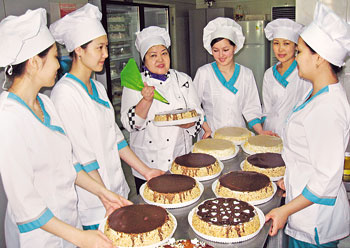URALSK – Entrepreneur Balziya Yeveneyeva is demonstrating that sharing success is the way to make it grow. She has equipped a classroom and a laboratory for the practical training of chefs and future culinary experts with her own funds. Some of these future master chefs are orphans who otherwise might not have had a chance to learn a trade or develop key professional skills.

Balziya Yeveneyeva teaches her students how to make the sweetest cake ever.
An economist by profession, Yeveneyeva was well aware that a business that is constantly developing can be a success, so she wanted to keep growing. A loan taken through the Business Road Map 2020 programme allowed her to establish her own business.
“Fortunately, I could buy a spacious unfinished building. We completed the finishing work and purchased equipment for the restaurant and the pastry shop. But the main goal, as always, was not just profit, but to produce products and services of excellent quality. I received a certificate of quality management, ISO 2001. Through that experience, I was convinced that such an approach ensures success. Chefs and cooks, as well as doctors, should have the basic requirement to do no harm,” she explained.
“You can call our products environmentally clean. I make this even simpler – no chemicals. I remember my grandmother’s recipes. The formula for success has been tested and proven through practice. You just need to work honestly, and the food on the table, of course, has to be not only delicious, but also pleasing to the eye.”
A medical officer watches the quality along the production conveyor. It is worth noting that not every company in catering has someone in such a position. Absolutely everything is checked there—the availability of certificates, feedstock, packaging, transportation conditions, storage periods and, of course, the finished product.
Yeveneyeva works only with trusted and reliable suppliers; the Russian-Italian company Crown-Agro, which is considered one of the best in the international market, is one. However, she considers consistency one of the essential qualities in business and in relationships with people. So, since the times of crisis, she has been working with engineer-confectioner Bibigul Kadarova. Together, they teach current and future chefs and cooks to prepare delicious and healthy food.
“With cakes and pastries, creativeness is needed, in addition to skills. We steer away from large amounts of brightly coloured cream,” she said. “Fine patterns provide more room for imagination. If a cake is called ‘A Fairy Tale,’ then the plot should be fabulous and recognisable. Besides, people nowadays tend to count calories strictly. This also has to be taken into account, because the demand creates supply.”
In order to be responsive to all current requirements, Yeveneyeva is constantly studying in her native city, in the capital and abroad. She has finished courses for production management at Zhangir Khan West Kazakhstan Agro-Technical University, and through the Business Road Map 2020 programme, she passed top management training at Nazarbayev University and passed advanced training in Germany.
“Yeveneyeva can be rightly considered an example of corporate social responsibility, a leading light. As a rule, only large companies are engaged systematically in staff training. She has a medium-sized business, but there is a lot to learn from her. It would be possible to realise the idea of dual training much easier and faster if more entrepreneurs cared about the rising generation as she does,” principal of a local college Elmira Dzheksenova said.
Children from orphanages also undergo training in Yeveneyeva’s master class. It is no secret that many of them are ill-prepared for independent life. The Umit Union of Women of Trans-Urals, with support from the BOTA Foundation, delivers training to help them obtain crucial skills. A cooking school for teenagers is held in Yeveneyeva’s master class. “The more you give, the more you get,” she believes. Success must be shared with others.
Yeveneyeva’s cabinet is hung with diplomas and certificates obtained for victories in various competitions at regional and national levels. Products “from Balziya” are more and more in demand.
“Balziya is a driven and responsive person who aims at achieving better results. Public-private partnerships, the need for which was stated in the December state-of-the-nation address of the President, must develop dynamically in small and medium-sized businesses. She illustrates this through her work. The regional coordinating council has recently approved another project: after obtaining credit on easy terms under the Business Road Map 2020 programme, Yeveneyeva will procure equipment for the production of biscuits using German technology. And there is more good news: her candidacy for an internship in the United States has been approved,” Director of the West-Kazakhstan branch of the Damu Entrepreneurship Development Fund Aliya Saliyeva said.
